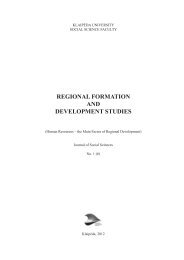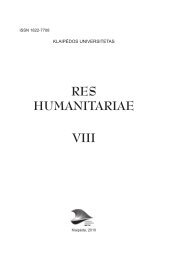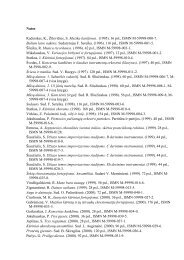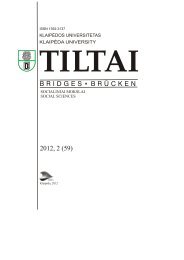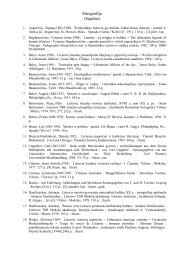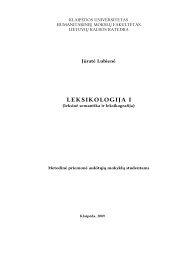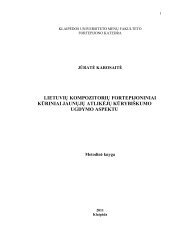2013,1 (62) - KlaipÄdos universitetas
2013,1 (62) - KlaipÄdos universitetas
2013,1 (62) - KlaipÄdos universitetas
Create successful ePaper yourself
Turn your PDF publications into a flip-book with our unique Google optimized e-Paper software.
Lijana Gvaldaitė, Jekaterina Bordun<br />
to report abortions conducted). Almost 60 percent of these are artificial abortions and<br />
this means that they have not been conducted due to miscarriages of medical indications<br />
but due to the will of the women when the decision to terminate the pregnancy is<br />
based on other type of factors, such as social, economical or psychological. When<br />
comparing this data to that of the previous years it can be seen that the number of<br />
abortions has decreased and tends to diminish (12.790 abortions registered in 2010,<br />
14.212 in 2008, 23.683 in 2000). Nevertheless, the “Evolution of the Family in Europe<br />
2009” survey has shown that the number of abortions in our country is one of the highest<br />
in the European Union. The report of the survey also stresses that Lithuania is one<br />
of the EU countries that does not prioritize the family. It is also important to note that<br />
despite of the fact that the birth-rate has been slightly increasing during the past few<br />
years, the statistical data confirm that the number of children in 2010 has diminished<br />
by 37,7 thousand) when comparing to that in 2008. In their conclusions the experts<br />
also emphasize that these numbers do not secure the natural generational change and<br />
the demographic situation is rather critical. The statistics of abortions show that almost<br />
one in three created lives is being terminated.<br />
The scientific information proves that abortion is a complex problem. It is relevant<br />
not only from the point of view of values and the world-view when the questions related<br />
to unborn life and women rights arise but implicates also a multi-aspectual scientific<br />
discussion. It is self-evident that it is not possible here to treat separately the negative<br />
impact to the physical and especially to the psychological health of the woman,<br />
her social life (this aspect is widely discussed in the psychological foreign and Lithuanian<br />
literature), in the end this is fundamental to the welfare of an individual, the family<br />
and also of the society itself. Despite of the different opinions and confrontations<br />
towards the contradiction of the choice of the woman and the right to existence of the<br />
unborn life, there is no doubt that abortion is a negative phenomenon and it should be<br />
recognised as a social problem that must be acknowledged and tried to solve.<br />
There has been little research of abortion in Lithuania. There have been some studies<br />
from the medical and juridical aspects: Sakalauskas, 2001; Kavoliūnaitė, 2005,<br />
2006; Dobrynina, Gavėnaitė et al., 2006; Sagatys, 2006; Juškevičius, 2007; Čaikovsky,<br />
Žukovaitė, 2010; Šaulauskienė, 2006; Serapinas, Bartkevičienė, 2006; Obelenienė,<br />
Švedas, 2006 and others. The problem of abortion is also mentioned when analysing<br />
the concept of a human and preserving life in the field of Christian anthropology and<br />
bioethics (Narbekovas 2003 and others). There are not enough detailed studies in this<br />
topic in the context of psychology, sociology and social work, as well as valid discussions<br />
of diverse field specialists and competent institutions that would be a stimulus to<br />
stir the political will and to create complex systems of prevention, intervention and<br />
postvention. The experience of other countries shows that psychologists and social<br />
workers collaborate in this field while in Lithuania only isolated initiative of psychological<br />
and social assistance are present and the involvement of these specialists is<br />
often episodic and minimal.<br />
This paper aims at discussing the problem of abortion in the context of social<br />
assistance and to reveal the reasons given by the surveyed women for choosing abortion<br />
as well as to determine the necessity of prevention of this problem.<br />
166



